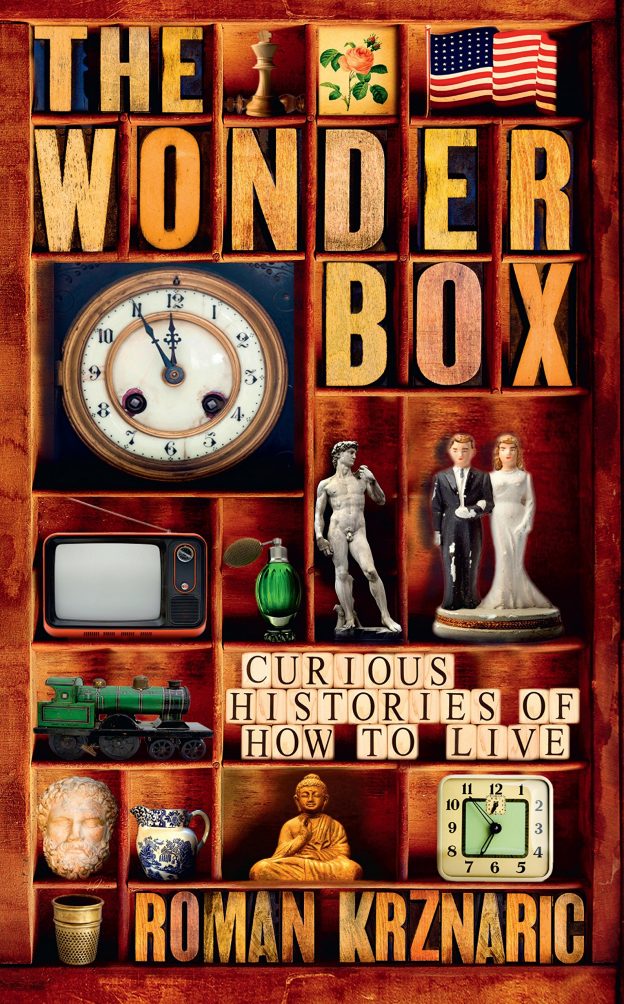‘Do not do unto others as you would have them do unto you – they may have different tastes.’ : George Bernard Shaw
Wonderbox: Curious Histories of How to Live – by Roman Krznaric
My choice of book is not concerned with Zen although a Buddhist priest is the focus of one of the chapters. I have written about a book I read last year that references some of the issues that continue to arise for me. Some of these include whether I have the courage and resilience to be myself and to live my values and beliefs, my awkward relationship with money, the importance of a nourishing work life, the benefits of living quickly and slowly, risk-taking, regret. Books are of a time and place for me – so there can never be just one book that is important. I read regularly and am constantly finding wonderful literature that aims to unpick the ideas I’m interested in. Steph recently passed me his copy of Instructions to the Cook by Bernard Glassman and it fits perfectly. As did the two Joko Beck books that were recommended during and after my first Zen retreat last year. Most importantly, both reading and meditation bring stuff to my attention that I can later give more time and thought to.
Chapter one of Wonderbox is titled Nurturing Relationships and the section on Empathy is inspirational. This chapter tells the story, among others, of Ku Klux Klan member Claiborne Paul Ellis from North Carolina who, in 1971, found himself working alongside a black woman at a ten-day community meeting to help solve racial problems in schools. (He turned up at the meeting with a machine gun in the back of his car and when asked his opinion blamed black people for the problems in the schools. He didn’t use the word black.) After working together Ann Atwater and C.P. Ellis soon realised they had lots in common and became good friends. Later, C.P Ellis became a civil rights campaigner and labour organiser for a union whose membership was 70 percent black. Ann Atwater says, as a result of this friendship, she no longer felt inferior to white people and now spoke openly to them on the street – most of C.P’s old KKK associates avoided him for the next 30 years.
The author sites Barack Obama’s belief that society is suffering from an ’empathy deficit’ and asks how hard we are trying to imagine and understand the realities of not only asylum seekers or elderly strangers but also those closest to us. How often, when locked in an argument, do we stop to not only consider their perspectives but also their needs and emotions. I often realise I’m not as open or as flexible as I thought and there are plenty of fixed bits of me – living in Beijing for two years taught me this. I often think of myself as empathic until someone starts being ‘unreasonable’. My empathy was really tested when I worked in high schools in Bootle and Everton. My thoughts were ‘I need you to be this way’, ‘This is the most sensible way’, ‘Why aren’t you more like this, more like me?’. I struggled to identify with difficult and challenging children which left me feeling that I’d failed. I left these schools. I walked away. This is a current theme for me, the memory of walking away from things instead of staying with what’s difficult and unknown.
I particularly liked reading about the author’s desire to dispel ‘The old-fashioned idea, rooted in seventeenth century social thought, that human beings are primarily selfish creatures dedicated to individual gain’ because I think human beings flourish in communities and love to co-operate and share. Other chapters are just as thought-provoking and stimulating and have given me insight into certain subjects, extended ideas of my own and provided consolation. Some books even help me to reveal parts of me that I have previously tried to keep to myself – why do I find it difficult to nurture friendships? Krznaric is a wise and thoughtful writer. He offers a subject and provides a context with which to view it in. His books are filled with curiosity and detail and suggestions on how to enhance certain areas of your life should you be so inclined. He makes me want to talk and experiment, be curious and get on with it, whatever it is.
I often find the contents pages useful:
Nurturing Relationships
- Love
- Family
- Empathy
Making a Living
- Work
- Time
- Money
Discovering the World
- Senses
- Travel
- Nature
Breaking Conventions
- Belief
- Creativity
- Deathstyle
By the way a wonderbox, or wunderkammer in German, is how the author views history – like a curiosity cabinet of the Renaissance. Cabinets that were used by collectors to display fascinating and unusual objects, each with a story to tell, that are passed down from one generation to another. They are ‘Repositories of family lore and learning, tastes and travels, a treasured inheritance… A shared inheritance of curious, often fragmented artefacts that we can pick up at will and contemplate in wonder’. We can, the author proposes, learn about life through intriguing stories and ideas from a myriad of cultures through history.
Roman Krznaric has also written ‘Carpe Diem: The Vanishing Art of Seizing the Day’ and ‘Empathy: Why it Matters and How to get It’. I recommend both of them. As I believe in ‘What is good is given back’, I have donated a copy of Wonderbox: Curious Histories of How to Live to the library at the Zendo. I hope you find it useful too.

